In the world of dental implants, success relies on integrated components working seamlessly together. While the implant itself takes center stage, one crucial but often unseen player is the dental prosthetic screw. These tiny screws play a vital role in securing the final restoration, ensuring a strong, long-lasting smile.
What Is A Dental Prosthetic Screw?
It is a specialized fastener used in dental implant treatment. It acts as the anchor between the implant body, embedded in the jawbone, and the dental restoration, such as a crown, bridge, or denture attachment. They are typically crafted from biocompatible titanium alloy, chosen for its strength, durability, and compatibility with human tissue.
The Importance of Dental Implant Screws
The importance of prosthetic screws cannot be overstated in ensuring the long-term success of dental implants. Imagine a house built with a shaky foundation – similarly, a loose restoration can put undue stress on the implant and surrounding bone, potentially leading to implant failure. They act as sturdy bolts that firmly anchor the restoration to the implant, mimicking the secure connection of a natural tooth root. This stability allows the implant to integrate seamlessly with the jawbone through a process called osseointegration, creating a strong and lasting foundation for your new smile.
Furthermore, they play a vital role in maintaining healthy peri-implant tissues, the gum and bone surrounding the implant. A loose restoration can create a gap where harmful bacteria can accumulate, increasing the risk of peri-implantitis, an inflammatory condition that can jeopardize the implant’s health. They, by creating a tight seal, prevent this from happening and contribute to the overall health and longevity of your implant restoration.
Beyond their functional importance, prosthetic screws offer several advantages in implant dentistry:
- The prosthetic screw is Strong and Stable:
Dental implant screws are designed to withstand the forces of biting and chewing, ensuring the restoration remains secure and functional for years to come. Unlike natural teeth held in place by flexible periodontal ligaments, dental implants rely solely on osseointegration, a process where the implant fuses directly with the jawbone. They play a critical role in this process by providing exceptional stability. Manufactured from high-strength titanium alloy, these tiny screws can endure the significant pressure exerted during chewing, preventing the restoration from loosening or coming loose.
- The prosthetic screw Improves Aesthetics
By creating a tight seal around the implant-abutment connection, prosthetic screws contribute to a natural-looking restoration in two key ways. Firstly, they eliminate any gaps where gum tissue could recede and expose the underlying metal post of the implant. This unsightly exposure can detract from the overall aesthetics of your smile. Secondly, a tight seal prevents the irritation and potential inflammation of gum tissue, which can lead to gum recession. Healthy, uninflamed gums hug the base of the restoration more naturally, mimicking the appearance of a natural tooth and enhancing the cosmetic outcome of your implant treatment.
- Long-lasting Durability
Made from high-quality materials, prosthetic screws are built to endure, minimizing the need for future interventions. Unlike some other dental restorations that may require adjustments or replacements over time,They are designed for exceptional longevity. The biocompatible titanium alloy construction offers superior strength and resistance to corrosion, ensuring the screws can withstand the demands of everyday use for many years to come. This translates to fewer dental visits for repairs or replacements, allowing you to enjoy a worry-free smile for the long term.
Different Types of Prosthetic Screws
The diverse world of dental implants necessitates a variety of designs to ensure optimal fit and function. Screw heads come in various configurations, such as the common hex driver slot for straightforward tightening with a specialized wrench. More intricate internal connections offer enhanced security and may require specific tools for placement and removal by your dentist.
While all dental screws share the core function of securing dental restorations to implants, the dental market offers a variety of types to cater to specific needs. Understanding these variations can be empowering for patients seeking implant dentistry. Here’s a breakdown of some commonly encountered prosthetic screws:
Variations in Size and Design:
These tiny components come in different diameters and lengths to match the dimensions of various implant systems and restoration types. For example, a single crown may require a smaller screw compared to a bridge spanning multiple teeth. Additionally, screw designs may differ in thread patterns or head styles (hex driver, internal connection) to optimize fit and ensure proper tightening with specialized tools.
Material Considerations:
While biocompatible titanium alloy remains the dominant choice, some manufacturers may offer variations. For instance, certain screws might have a special surface coating for enhanced osseointegration (fusion of implant with bone) or improved stability.
Also look: Unveiling the Ultimate Guide to Dental Implant Materials: A Comprehensive Overview
Prevailing vs. Torque Controlled Prosthetic Screws:
Prevailing torque screws come pre-loaded with a specific tightening force, simplifying the placement process. Torque-controlled screws, on the other hand, require a dentist to measure the tightening force during placement, offering more precise control.
Not All Screws Are Created Equal: Choosing the Right Screw for Your Implant
Dental implants have revolutionized how we replace missing teeth, offering a natural-looking and long-lasting solution. But behind the scenes, a network of tiny yet crucial components ensures the success of these implants. One such component is the prosthetic screw, a specialized fastener that secures the final restoration (crown, bridge, etc.) to the implant body.
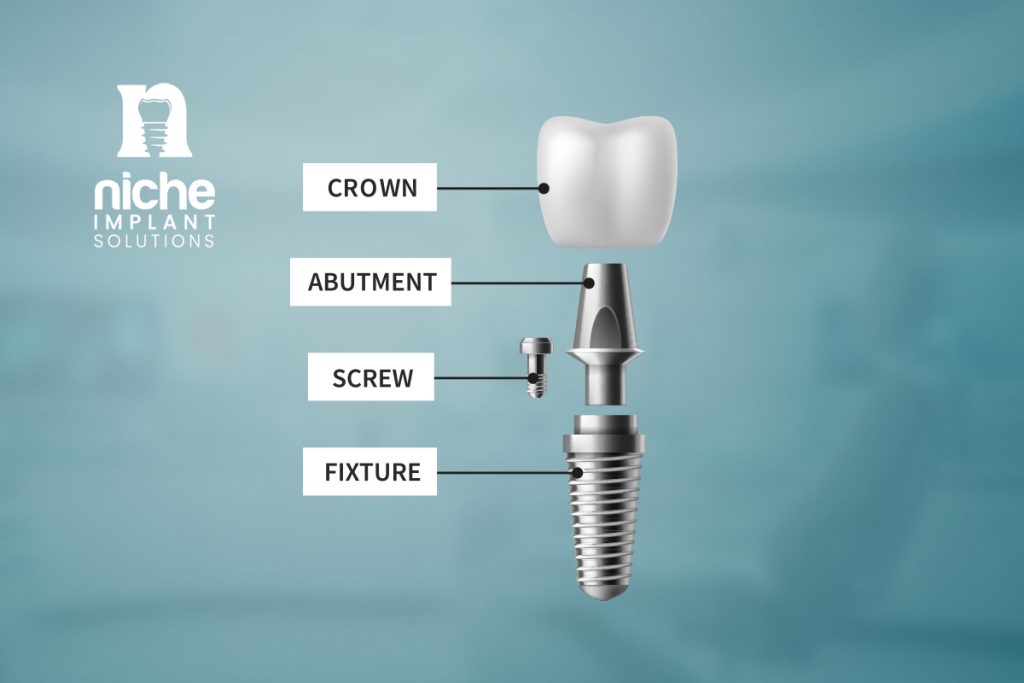
The Importance of the Right Fit
Imagine building a house – the wrong screws could compromise the entire structure. Similarly, an ill-fitting dental screw can lead to a loose restoration, potentially causing discomfort, future complications, and even implant failure. The right screw size and design ensure a secure and stable connection between the implant and restoration.
While they may seem insignificant, choosing the right screw is essential for optimal implant function and longevity. It’s important to remember that the selection of the most suitable prosthetic screw type ultimately rests with your dentist. Their expertise and experience will guide them in choosing the ideal screw based on factors like:
- The specific implant system being used
- The type of restoration (crown, bridge, denture attachment)
- Individual patient anatomy and requirements
While understanding these factors is empowering, the selection of the most suitable dental implant screw type ultimately rests with your dentist.
The Strength and Safety of Titanium in Niche’s Prosthetic Screws
If we talk about Niche’s screws we should know what makes them so effective? The answer lies in the exceptional material they’re crafted from, biocompatible titanium alloy.This specific type of titanium is chosen for its winning combination of strength and tissue compatibility. Let’s delve deeper into these key characteristics:
Strength: The human jaw endures significant pressure during chewing. Prosthetic screws need to be incredibly strong to withstand these forces and ensure the restoration remains secure for years to come. Titanium alloys excel in this area, offering exceptional durability without compromising size.
Tissue Compatibility: Biocompatibility refers to a material’s ability to coexist peacefully with human tissue. Titanium boasts excellent biocompatibility, minimizing the risk of rejection or allergic reactions in the jawbone and surrounding gum tissue. This allows for a smooth implant integration and restoration into the oral environment.
The unique properties of biocompatible titanium alloy make it the ideal choice for prosthetic screws. It provides the strength needed for a long-lasting, functional restoration while prioritizing patient safety and comfort through excellent tissue compatibility.
Placement and Care of Dental Implant Screws
The placement of screws is a delicate procedure performed by a dentist or oral surgeon. Following placement, proper dental hygiene is essential to maintain the integrity of the screw and surrounding tissues. Regular dental checkups allow your dentist to monitor the screw’s tightness and address any potential issues promptly.
Factors Influencing Prosthetic Screw Cost
While they may seem small, screws play a vital role, and understanding their cost is a valuable piece of the implant treatment puzzle.Unlike a single price tag, the cost of them can vary depending on several factors:
Number of Dental Screws Required
The number of screws needed depends on the type of restoration being placed. A single crown typically requires one screw, while a bridge spanning multiple teeth might necessitate several.
Implant System Compatibility
Different implant systems like (Straumann, Zimmer, Megagen, Osstem, and other implants” utilize specific screw designs and dimensions to ensure a secure fit. The cost of the screw can vary depending on the particular implant system used.
Transparency is Key
The best way to determine the specific cost of prosthetic screws in your implant treatment is to have an open conversation with your dentist. A reputable dental professional will provide a transparent breakdown of all associated costs, including the cost of them. This allows you to create a clear budget and make informed decisions about your implant treatment.
Beyond the Price Tag
While cost is a crucial factor, it’s important to remember that prosthetic screws are an investment in the long-term success and functionality of your implant restoration. Their role in ensuring a secure and stable connection contributes to the overall value and longevity of your implant treatment.
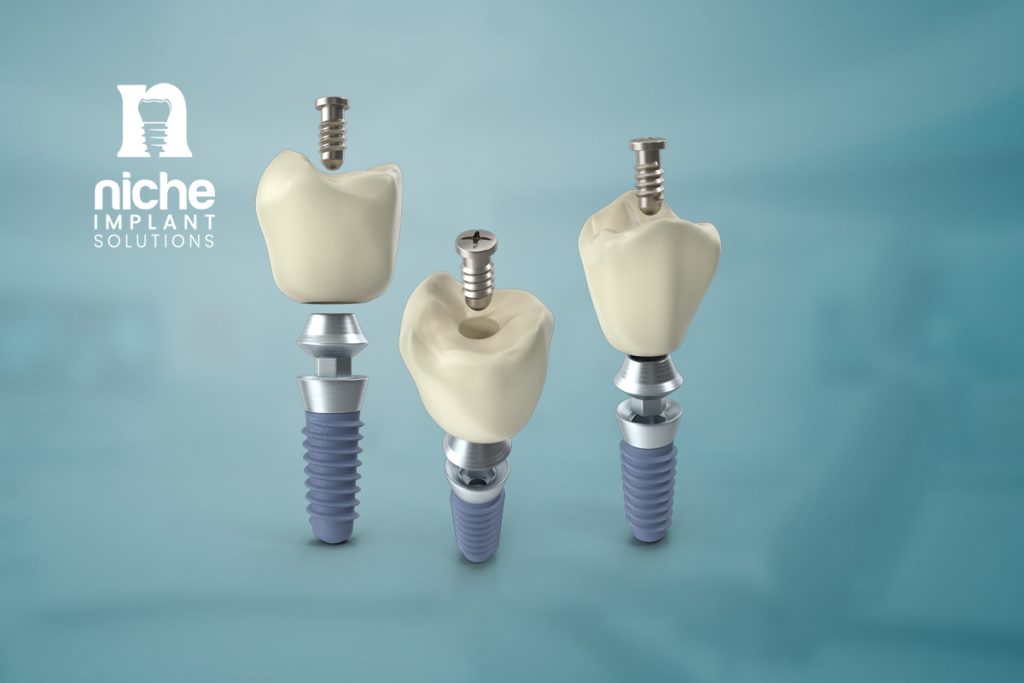
Focus on Quality and Expertise
When choosing a dental professional for your implant treatment, prioritize their qualifications and experience. A skilled dentist will select the most suitable prosthetic screw type based on your specific needs, ensuring optimal results and potentially minimizing the need for future interventions.
By understanding the factors influencing screw costs and prioritizing open communication with your dentist, you can navigate the financial aspects of implant treatment with confidence. And as a dentist, you can order your dental screw from Niche dental solutions website at affordable prices
In Conclusion
While small in stature, dental screws play a significant role in the world of dental implants. These tiny components provide a strong foundation for your implant-supported restoration, ensuring a healthy, functional, and long-lasting smile. If you have any questions about prosthetic screws or implant dentistry in general, consult with your dentist to learn more.

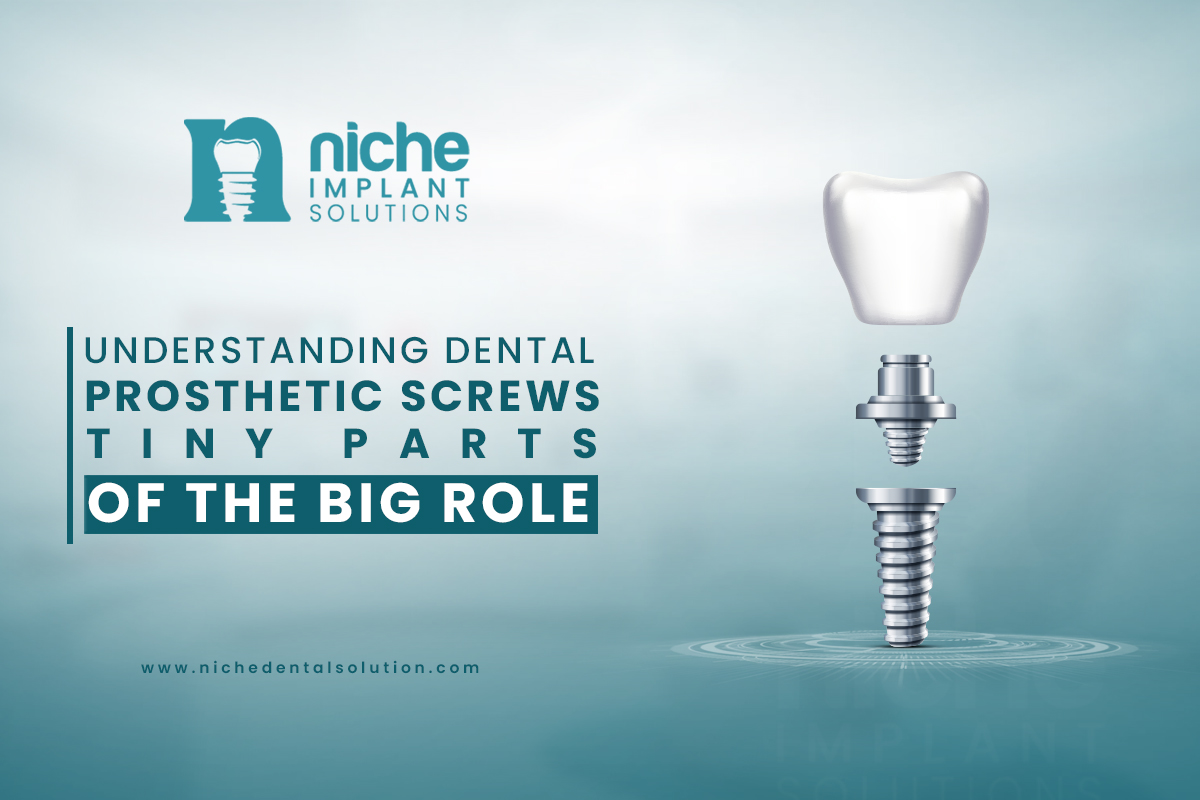
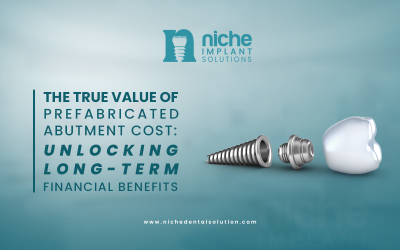
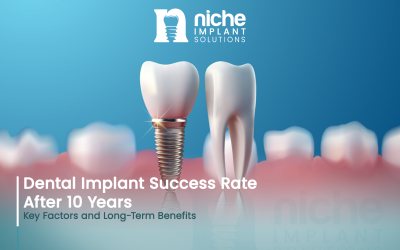

0 Comments